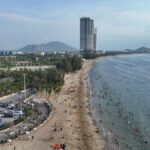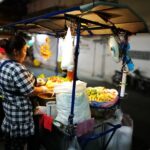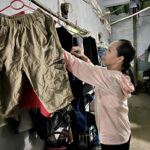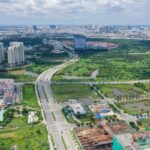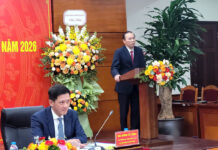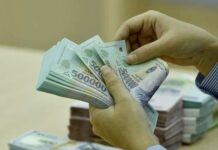Retaining Domestic Capital
Echoing the Ministry of Finance’s recent proposal to pilot allowing Vietnamese citizens to gamble at casinos that meet regulations, National Assembly Deputy Pham Van Hoa from Dong Thap Province agreed: “We have also proposed multiple times that casinos should be opened to Vietnamese citizens to manage capital outflow and increase state budget revenue. If well-managed, this move will prevent capital from flowing overseas, generating significant revenue for the state budget and contributing to social welfare.”
Deputy Hoa provided evidence that before Vietnam implemented this policy, Vietnamese citizens with a penchant for gambling would have to travel to neighboring countries such as Cambodia, Thailand, Malaysia, and China to indulge in their hobby.
“I support the idea of permitting Vietnamese citizens to gamble at casinos to manage and attract capital inflows. We should avoid the mindset of prohibiting something just because we cannot control it. Many countries worldwide have embraced this service. If Vietnam doesn’t allow it openly, many will still gamble clandestinely, and we won’t collect any taxes,” Mr. Hoa asserted.
The deputy also optimistically stated that opening casinos to Vietnamese citizens, if designed and operated within a tightly controlled framework, could create positive spillover effects.
“Firstly, it presents an opportunity to retain domestic spending and transform Vietnam into an appealing destination for premium entertainment, thereby attracting international tourists. This policy will enhance the competitiveness of our tourism industry as many neighboring countries heavily invest in casinos to stimulate their tourism sectors,” Deputy Hoa analyzed.

Many shared the sentiment of permitting Vietnamese citizens to gamble at casinos. (Illustrative image)
Sharing the same viewpoint, Mr. Tran The Dung, CEO of Vietluxtour Travel Joint Stock Company, emphasized: “I believe that opening casinos to Vietnamese citizens can provide a significant boost to the tourism industry if implemented methodically, as casinos are a unique tourism product. Combining them with hotels, conferences, cuisine, and shopping will create a comprehensive entertainment tourism package, appealing to both international and domestic tourists. Piloting the inclusion of Vietnamese citizens will help retain a substantial amount of domestic spending, increase state budget revenue, and provide additional incentives for infrastructure and service development,” said Mr. Dung.
Mr. Dung also pointed out that thousands of people exit the country to Cambodia daily, many of whom go there solely for gambling. Additionally, millions of Vietnamese tourists visit Singapore, Macau, and Hong Kong annually, and a significant portion of them indulge in casino entertainment and test their luck.
Meanwhile, within Vietnam, only Casino Phu Quoc in An Giang Province has been permitted to pilot allowing Vietnamese citizens to gamble, while all other casinos remain off-limits to locals. This indicates a vast potential for casinos to attract Vietnamese citizens, and we should seize this opportunity promptly.
Permission Granted but Stringent Management Required
While agreeing with the Ministry of Finance’s proposal, experts emphasized the necessity of practical assessments to devise specific management solutions when opening casinos to Vietnamese citizens.
According to Mr. Tran The Dung, casinos should only be established within large-scale tourism complexes that possess a synchronous tourism ecosystem, such as Phu Quoc, Van Don, Nha Trang, Danang, and Hoi An. Simultaneously, a stringent control mechanism must be in place, aiming to integrate casinos as a component within the entertainment tourism package rather than a sole gambling destination.
“If we decide to open casinos to Vietnamese citizens and manage them effectively, we should definitely proceed as it will cater to tourists’ demands, increase state budget revenue, and curb capital outflow. However, we must ensure that those who gamble do so healthily, without causing adverse effects or social issues. We should stipulate the eligible gambling demographic and the maximum allowable gambling amount per visit,” Mr. Dung stated.
Deputy Pham Van Hoa also suggested that if the Ministry of Finance’s proposal is approved, detailed regulations regarding eligible participants and gambling amounts should be immediately implemented. Moreover, instead of a nationwide rollout, the pilot program should initially be confined to localities that attract a substantial number of tourists, especially international visitors.
In the draft decree on casino business operations currently open for feedback, the Ministry of Finance proposed piloting the admission of Vietnamese citizens to casinos that meet the requirements. Accordingly, Vietnamese citizens would be required to purchase daily tickets priced at VND 2.5 million (approx. USD 106) or monthly tickets at VND 50 million (approx. USD 2,120). These prices are double or two-and-a-half times the current rates.
Additionally, Vietnamese citizens must be at least 21 years old and have full civil act capacity. They are only permitted to use VND to exchange for the designated casino currency and can exchange any remaining casino currency back into VND upon departure.
Gamblers are responsible for the accuracy of the documents they present to the casino operator for entry. Casino operators, meanwhile, are responsible for checking, screening, and storing these documents for a minimum of five years. They must also separately account for revenue from ticket sales, declare the number of Vietnamese gamblers, and deposit the ticket revenue into a state treasury account.
The Deadline Has Passed, Yet Ninh Thuan Has Only Implemented 13 Out of 17 Special Policies
Over the past five years, the province has implemented only 13 out of 17 policies outlined in the Government’s Resolution No. 115, dated August 31, 2018, on the implementation of special mechanisms and policies to support the socio-economic development and stabilize production and people’s lives in Ninh Thuan Province for the 2018-2023 period.
Unlocking the Power Puzzle: Attracting Investments for a Cleaner Energy Future
The current pricing structure and electricity tariff calculation methods are not keeping up with the market rate and are considered the biggest bottleneck that needs to be addressed. By untangling this knot, the electricity industry can attract investment in power development, especially in clean energy, thus contributing to ensuring the country’s energy security.
“United for Her Health: A Collaborative Effort by Three Financial Institutions for Vietnamese Women’s Wellbeing.”
The financial strain on vulnerable women in Vietnam has made it difficult for them to access healthcare services, especially early cancer screening. The social welfare program, “Touch to Share, Give Hope,” by NAPAS, Mastercard, and Payoo offers a ray of hope by providing free cancer screening opportunities to thousands of women.

